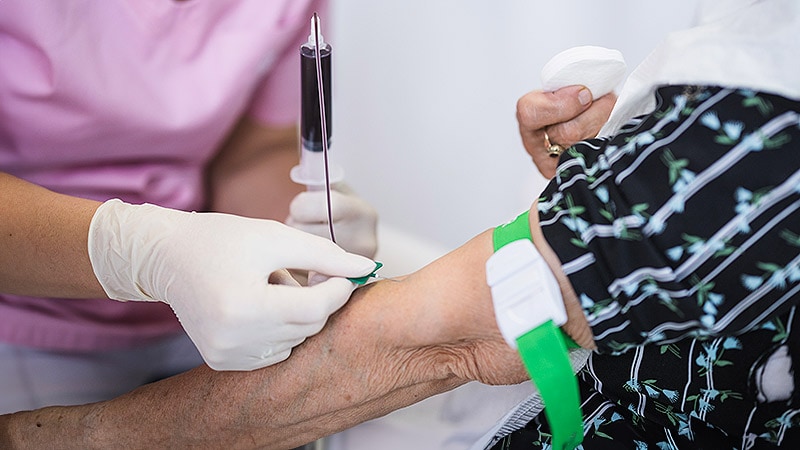News
Alzheimer’s Blood Test in Primary Care Could Slash Diagnostic Times

As disease-modifying remedies for Alzheimer’s illness (AD) turn out to be obtainable, equipping main care physicians with a extremely correct blood take a look at may considerably cut back diagnostic wait instances. Presently, the affected person diagnostic journey is commonly extended owing to the restricted variety of AD specialists, inflicting concern amongst healthcare suppliers and sufferers alike. Now, a brand new research means that use of high-performing blood checks in main care may determine potential sufferers with AD a lot earlier, probably decreasing wait instances for specialist care and receipt of therapy.
“We have to triage in main care and ship preferentially those that truly could possibly be eligible for therapy, and never those that are simply frightened as a result of their grandmother reported that she has Alzheimer’s,” lead researcher Soeren Mattke, MD, DSc, informed Medscape Medical Information.
“By combining a short cognitive take a look at with an correct blood take a look at of Alzheimer’s pathology in main care, we are able to cut back pointless referrals, and shorten appointment wait instances,” stated Mattke, director of the Mind Well being Observatory on the College of Southern California in Los Angeles.
The findings had been offered on July 28 on the Alzheimer’s Affiliation Worldwide Convention (AAIC) 2024.
Projected Wait Instances 100 Months by 2033
The investigators used a Markov mannequin to estimate wait instances for sufferers eligible for AD therapy, considering constrained capability for specialist visits.
The mannequin included the projected US inhabitants of individuals aged 55 years or older from 2023 to 2032. It assumed that people would bear a short cognitive evaluation in main care and, if suggestive of early-stage cognitive impairment, be referred to a AD specialist below three eventualities: no blood take a look at, blood take a look at to rule out AD pathology, and blood take a look at to substantiate AD pathology.
In response to the mannequin, with out an correct blood take a look at for AD pathology, projected wait instances to see a specialist are about 12 months in 2024 and can improve to greater than 100 months in 2033, largely owing to an absence of specialist appointments.
In distinction, with the supply of an correct blood take a look at to rule out AD, common wait instances could be simply 3 months in 2024 and improve to solely about 13 months in 2033, as a result of far fewer sufferers would wish to see a specialist.
Availability of a blood take a look at to rule in AD pathology in main care would have a restricted impact on wait instances as a result of 50% of sufferers would nonetheless bear confirmatory testing primarily based on knowledgeable assumptions, the mannequin suggests.
Prioritizing Sources
“Hundreds of thousands of individuals have delicate reminiscence complaints, and if all of them begin coming to neurologists, it may utterly flood the system and create lengthy wait instances for everyone,” Mattke informed Medscape Medical Information.
The issue, he stated, is that temporary cognitive checks carried out in main care should not significantly particular for delicate cognitive impairment.
“They work fairly nicely for manifest superior dementia however for delicate cognitive impairment, which is a really refined, symptomatic illness, they’re solely about 75% correct. One quarter are false-positives. That is lots of people,” Mattke stated.
He additionally famous that though earlier blood checks had been about 75% correct, they’re now about 90% correct, “so we’re attending to a degree the place we are able to just about say with confidence that that is seemingly Alzheimer’s,” Mattke stated.
Commenting on this analysis for Medscape Medical Information, Heather Snyder, PhD, vp of medical and scientific relations on the Alzheimer’s Affiliation, stated it’s clear that blood checks, “as soon as confirmed, may have a major influence on the wait instances” for dementia evaluation.
“After an preliminary blood take a look at, we’d be capable to rule out or rule in people who ought to go to a specialist for additional follow-up and testing. This permits us to actually make sure that we’re prioritizing sources accordingly,” stated Snyder, who was not concerned within the research.
This venture was supported by a analysis contract from C2N Diagnostics, LLC to USC. Mattke serves on the board of administrators of Senscio Methods, Inc., and the scientific advisory board of ALZPath and Boston Millennia Companions and has obtained consulting charges from Biogen, C2N, Eisai, Eli Lilly, Novartis and Roche/Genentech. Snyder has no related disclosures.
